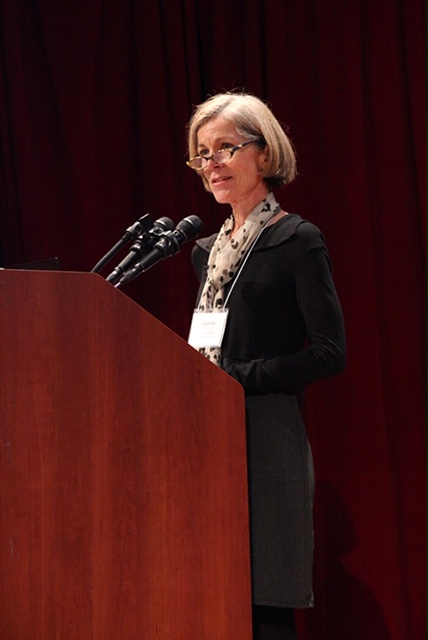A study by researchers at Teachers College’s National Center for Children & Families sheds new light on the too-often overlooked importance of early care and education for infants and toddlers.
Quality care and learning for infants and toddlers is critically important for effective development, yet currently access to quality programs is limited and providers, whether they teach in homes or centers, are under-resourced and underpaid for the value of their services.

URGENT MESSAGE The recommendations by Jeanne Reid and her NCCF co-authors come at a time when many programs for infants and toddlers have closed due to COVID-19. (Photo courtesy of Jeanne Reid)
The study emphasizes the value of both family child care (FCC) and center-based programs to New York City’s diverse community of children and families. The authors identify the challenges of promoting quality in both settings, point to the need to recognize the unique assets of FCCs, and make recommendations on how to support programs for infants and toddlers in both settings at a time when programs are closing due to COVID-19.
It is critical to make sure the FCCs and centers who care for our babies and toddlers are both high-quality and sustainable. That means higher compensation, customized and accessible professional development, and managerial support that responds to the unique needs of each setting.
—Jeanne Reid
“This study shows us the relative strengths of care in family child care and center-based programs,” says lead author Jeanne Reid, NCCF Research Scientist. “It is critical to make sure the FCCs and centers who care for our babies and toddlers are both high-quality and sustainable. That means higher compensation, customized and accessible professional development, and managerial support that responds to the unique needs of each setting.”
[Read the full study, Enhancing the Quality of Infant and Toddler Care in New York City: Variation Across EarlyLearn Settings, which was co-authored by Reid; NCCF Graduate Fellow Samantha A. Melvin, a doctoral student in Education Policy; and NCCF’s two Co-Directors, Sharon Lynn Kagan, Virginia and Leonard Marx Professor of Early Childhood and Family Policy, and Jeanne Brooks-Gunn, Virginia and Leonard Marx Professor of Child Development and Education.]
The researchers collected data in 2019 from surveys of 32 center directors, 32 center teachers, and 30 FCC leaders, who act as both directors and teachers. The surveys contain a mix of close-ended and open-ended questions that address program characteristics and management; director and teacher characteristics, compensation, and well-being; instructional approach, practice, and content; program quality and job perceptions; and professional development. The new publication complements a 2018 NCCF study, Building a Unified System for Universal Pre-K in New York City: The Implementation of Pre-K for All by Setting and Auspice, which compared the characteristics and quality of Pre-K for All programs in schools and New York Early Education Centers.
In the new study, the authors argue that particular consideration should be given to the distinctive assets of programs and the cultural communities they serve. That focus shifts the lens through which quality is viewed — particularly for FCCs, which often develop trusting relationships in home-like settings that many families prefer for their babies and toddlers. FCCs are also more likely to accommodate the needs of families who have irregular or non-standard work hours.
We collected data last year, prior to the pandemic, but we are releasing it now in an environment that makes it even more relevant. The child-care landscape has been devastated by COVID, and we have to think about options for rebuilding it in ways that equitably meet the needs of diverse communities.
—Jeanne Reid
“We collected data last year, prior to the pandemic, but we are releasing it now in an environment that makes it even more relevant,” says Reid. “The child-care landscape has been devastated by COVID, and we have to think about options for rebuilding it in ways that equitably meet the needs of diverse communities. There’s evidence of increasing demand for family child care, perhaps because FCCs are often closer to parents’ homes and more consonant with their values.”
In fact, Reid suggests, there may be a particular need to increase funding for family child care that serves the very youngest children. “There’s some concern that more FCCs may get pulled into serving three-year-olds at the expense of infants and toddlers,” she says. “We think that both FCCs and centers deserve more support, particularly when so many are closing and we don’t know how many of the rest will be able to hang on. More funding is required to operate programs that serve babies and toddlers, where each adult is responsible for a smaller number of children than in programs for older children.”
The authors make several evidenced-based policy recommendations, including to:
- Increase compensation for FCC leaders and center teachers who care for infants and toddlers, and financially support and reward those who pursue additional training.Both FCC and center educators work for poverty-level wages—an average of about $30,000 per year with little or no benefits.
- Increase administrative support for FCCs and increase funding for non-standard work hours in both settings.Better funding for non-standard work hours is critical in both settings, as more low-income families work in jobs with non-standard or irregular hours. FCC leaders also need more managerial support as they work long hours to care for infants and toddlers while struggling to run a business and meet program requirements.
- Preserve and encourage the culturally rich options that parents seek.The City should use models and metrics of quality that recognize the distinctive strengths of FCCs and centers for infants and toddlers.
The NCCF study was made possible by The New York City Early Childhood Research Network, a unique partnership of researchers from the city’s higher education institutions who work with the New York City Department of Education, New York City Administration for Children’s Services, New York City Department of Health and Mental Hygiene, and the Mayor’s Office for Economic Opportunity to study the implementation of New York City’s early childhood system and use the knowledge gained to improve instruction and outcomes for all children. The study was funded by the New York Early Childhood Professional Development Institute at the City University of New York (CUNY) and the Heising-Simons Foundation.
